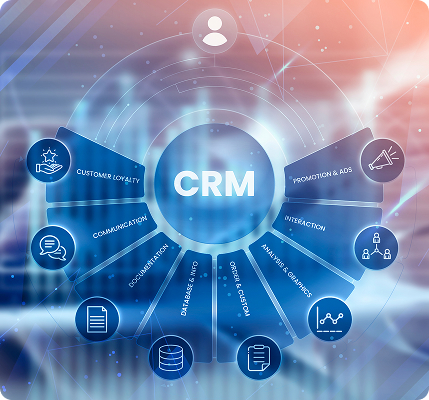ERP - CRM Deployment Models
ERP (Enterprise Resource Planning) and CRM (Customer Relationship Management) systems are two important platforms that help businesses optimize operational processes and customer management. However, not every business is suitable for a one-size-fits-all solution. Depending on needs and scale, businesses can choose different deployment models or even build their own systems.
1. ERP - CRM Deployment Models
Currently, businesses have many choices for ERP/CRM deployment models, each with its own advantages and disadvantages.
1.1. On-premise
- Description: ERP/CRM systems installed directly on the company's internal servers.
- Advantages:
- Disadvantages:
- Suitable for: Large enterprises with high data security requirements and complex process systems.
1.2. Cloud-based
- Description: ERP/CRM systems hosted on third-party cloud platforms.
- Advantages:
- Disadvantages:
- Suitable for: Small and medium-sized businesses, startups that need quick and flexible deployment.
1.3. Hybrid
- Description: Combines On-Premise and Cloud-Based models to leverage the benefits of both.
- Advantages:
- Disadvantages:
- Suitable for: Businesses with sensitive data that still want to take advantage of cloud technology flexibility.
1.4. SaaS (software as a service)
- Description: Businesses rent ERP/CRM services from software providers (Salesforce, SAP, Microsoft Dynamics, Odoo, etc.).
- Advantages:
- Disadvantages:
- Suitable for: Small and medium-sized businesses, startups looking to optimize costs and implementation time.
2. When should businesses build their own ERP/CRM systems?
Not every business is suited for off-the-shelf ERP/CRM solutions. Below are situations when businesses should consider developing their own systems:

2.1. When business processes are unique
Common ERP/CRM solutions are typically designed for standard processes. If a business has complex and unique operational processes, building a custom system will help optimize work efficiency, reduce dependency on unsuitable software, and increase the ability to meet business needs.
2.2. When deep integration with existing systems is needed
If a business has already invested in internal systems such as inventory management, accounting, production, IoT, AI, etc., a customized ERP/CRM system can ensure synchronization, reduce integration costs, and avoid the risk of data loss due to incompatibility between different systems.
2.3. When businesses need complete data control
Using third-party solutions may cause businesses to lose control over important data, especially in industries with high security requirements such as finance, healthcare, and government. Custom systems help businesses actively manage data, limiting the risk of leakage or loss of information.
2.4. When the cost of using SaaS solutions becomes expensive
SaaS services may initially be attractive due to low costs and quick deployment, but in the long term, maintenance and expansion costs can far exceed the business budget. Building your own system helps businesses be financially proactive, avoiding dependence on the pricing model of SaaS providers.
2.5. When continuous customization and development are needed
Some businesses operate in highly competitive environments, continuously changing their business models. Ready-made ERP/CRM systems are often not flexible in quick updates. If a business needs frequent customization, a self-developed system can provide a competitive advantage, helping the business adapt to the market faster.
2.6. When businesses want to own core technology
Building your own ERP/CRM not only helps businesses have a suitable system but also creates proprietary technological advantages. If a business has ambitions to develop and leverage data to create greater benefits (AI, advanced data analytics, automation, etc.), owning core technology will be a key factor.
Conclusion
Choosing the right ERP/CRM deployment model plays an important role in a business's digitization strategy. If a business has standard processes and wants to optimize costs, SaaS or Cloud-Based solutions may be appropriate choices. However, if a business has unique processes, high security requirements, or wants to optimize long-term costs, building its own ERP/CRM system may bring many benefits.
Are you considering implementing ERP/CRM for your business? Contact us for advice on the most suitable solution!
